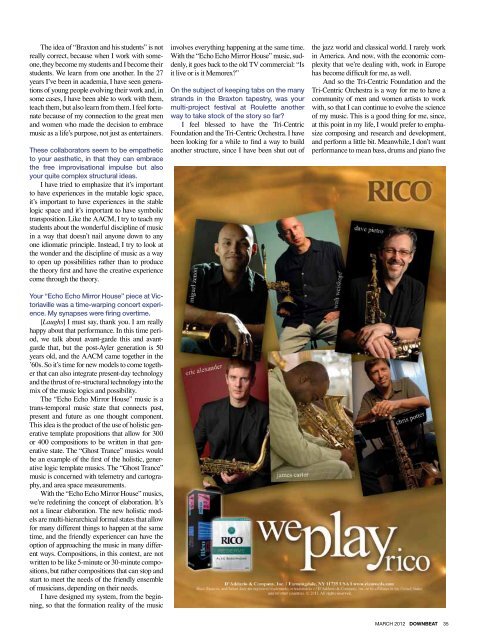You also want an ePaper? Increase the reach of your titles
YUMPU automatically turns print PDFs into web optimized ePapers that Google loves.
The idea of “Braxton and his students” is not<br />
really correct, because when I work with someone,<br />
they become my students and I become their<br />
students. We learn from one another. In the 27<br />
years I’ve been in academia, I have seen generations<br />
of young people evolving their work and, in<br />
some cases, I have been able to work with them,<br />
teach them, but also learn from them. I feel fortunate<br />
because of my connection to the great men<br />
and women who made the decision to embrace<br />
music as a life’s purpose, not just as entertainers.<br />
These collaborators seem to be empathetic<br />
to your aesthetic, in that they can embrace<br />
the free improvisational impulse but also<br />
your quite complex structural ideas.<br />
I have tried to emphasize that it’s important<br />
to have experiences in the mutable logic space,<br />
it’s important to have experiences in the stable<br />
logic space and it’s important to have symbolic<br />
transposition. Like the AACM, I try to teach my<br />
students about the wonderful discipline of music<br />
in a way that doesn’t nail anyone down to any<br />
one idiomatic principle. Instead, I try to look at<br />
the wonder and the discipline of music as a way<br />
to open up possibilities rather than to produce<br />
the theory first and have the creative experience<br />
come through the theory.<br />
Your “Echo Echo Mirror House” piece at Victoriaville<br />
was a time-warping concert experience.<br />
My synapses were firing overtime.<br />
[Laughs] I must say, thank you. I am really<br />
happy about that performance. In this time period,<br />
we talk about avant-garde this and avantgarde<br />
that, but the post-Ayler generation is 50<br />
years old, and the AACM came together in the<br />
’60s. So it’s time for new models to come together<br />
that can also integrate present-day technology<br />
and the thrust of re-structural technology into the<br />
mix of the music logics and possibility.<br />
The “Echo Echo Mirror House” music is a<br />
trans-temporal music state that connects past,<br />
present and future as one thought component.<br />
This idea is the product of the use of holistic generative<br />
template propositions that allow for 300<br />
or 400 compositions to be written in that generative<br />
state. The “Ghost Trance” musics would<br />
be an example of the first of the holistic, generative<br />
logic template musics. The “Ghost Trance”<br />
music is concerned with telemetry and cartography,<br />
and area space measurements.<br />
With the “Echo Echo Mirror House” musics,<br />
we’re redefining the concept of elaboration. It’s<br />
not a linear elaboration. The new holistic models<br />
are multi-hierarchical formal states that allow<br />
for many different things to happen at the same<br />
time, and the friendly experiencer can have the<br />
option of approaching the music in many different<br />
ways. Compositions, in this context, are not<br />
written to be like 5-minute or 30-minute compositions,<br />
but rather compositions that can stop and<br />
start to meet the needs of the friendly ensemble<br />
of musicians, depending on their needs.<br />
I have designed my system, from the beginning,<br />
so that the formation reality of the music<br />
involves everything happening at the same time.<br />
With the “Echo Echo Mirror House” music, suddenly,<br />
it goes back to the old TV commercial: “Is<br />
it live or is it Memorex”<br />
On the subject of keeping tabs on the many<br />
strands in the Braxton tapestry, was your<br />
multi-project festival at Roulette another<br />
way to take stock of the story so far<br />
I feel blessed to have the Tri-Centric<br />
Foundation and the Tri-Centric Orchestra. I have<br />
been looking for a while to find a way to build<br />
another structure, since I have been shut out of<br />
the jazz world and classical world. I rarely work<br />
in America. And now, with the economic complexity<br />
that we’re dealing with, work in Europe<br />
has become difficult for me, as well.<br />
And so the Tri-Centric Foundation and the<br />
Tri-Centric Orchestra is a way for me to have a<br />
community of men and women artists to work<br />
with, so that I can continue to evolve the science<br />
of my music. This is a good thing for me, since,<br />
at this point in my life, I would prefer to emphasize<br />
composing and research and development,<br />
and perform a little bit. Meanwhile, I don’t want<br />
performance to mean bass, drums and piano five<br />
MARCH 2012 DOWNBEAT 35

















